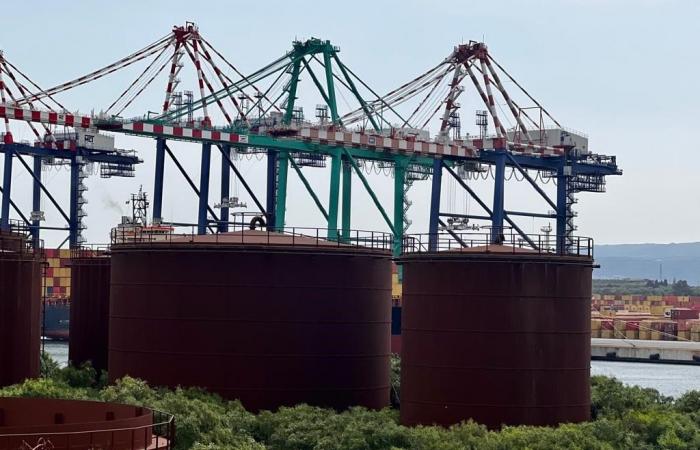Gioia Tauro – The victory of the Port System Authority of the Southern Tyrrhenian and Ionian Seas against the Gioia Tauro Oil Company (SPGT) is clear.
The Council of State rejected the appeal brought by SPGT on appeal, thus putting an end to a long-standing affair which, since 1995, has seen the port of Gioia Tauro affected by a request for state concession aimed at the construction of a coastal warehouse for the storage of mineral oils (petrol and diesel) with a capacity of 40 thousand cubic meters in 14 tanks.
The Council of State reiterated what was decided, in May 2023, by the Administrative Court of Reggio Calabria, in judging the denial of a private request as fully legitimate which, through public financing pursuant to law no. 488 – sadly known in the Calabrian territory – would have wanted to create a settlement of no public interest in an area with obvious seismic risk, so much so that the complex preliminary investigation process had never been completed over the decades.
Great satisfaction was expressed by the president Andrea Agostinelli who declared: – “I have to say thanks to the law firm of the prof. Stefano Zunarelli, to my Offices and to the Maritime Authority, who with patience and great professional ability have been able to reconstruct and highlight – during a very long and very tortuous chronological period – the reasons of the Authority in opposing an application that has always lacked necessary training supports and in conflict with port planning”. The story began in 1995, when the SPGT company presented a request for concession to the Port Authority of Reggio Calabria. After having started an extensive preliminary investigation, the Maritime Authority, in 1997, expressed a partial acceptance and reached the conclusion of a deed of submission which provides for the concession, by the Public Administration, of the possibility of starting the works , with the reservation of blocking them in the event of a negative outcome of the investigation, also defining the consequent and total assumption of responsibility by the private party. Once the interim deed was signed, in 1998, the Gioia Tauro Petrolifera Company began work, while the administrative process, for competence, passed to the soon-to-be-established port master’s office of Gioia Tauro. Naturally, being precisely in a phase of submission, the investigative process proceeds and sees the involvement of the Superior Council of Public Works which, as evidence of the complexity of the matter, expressed itself with various pronouncements between 1998 and 2001. It requires design integrations regarding structural deficiencies of the tanks (for which the construction of a containment basin placed at the base of the tanks to protect the sediment had not been foreseen and the failure to design a berth for the barges (tanker ships that transport mineral oils). Thus we reach 2000 with the first stoppage of works imposed by the Port Authority of Gioia Tauro which, in acquiring the resolutions of the Council of Public Works, highlights the lack of correspondence between what was achieved and what was planned .
But in the following year, with a vote of 449, the Superior Council of Public Works authorized the continuation of only the works on land and not those relating to the coastal approach, for which it required the company to present three technical studies. For the first, he requests the study relating to the extreme seismic risk that could be generated by the construction of the work, also considering the seismic zone 1 on which the port of Gioia Tauro falls. With the second study, the analysis of the consequent modification of the morphology of the coastline is requested, following a possible construction of a coastal approach. And finally, with the third study, the company is invited to analyze the possible modification that the morphological nature of single-grain sands could undergo, due to their own liquefaction. But faced with the analytical requests formulated by the Council of Public Works, the company Società Petrolifera Gioia Tauro has never produced anything. Thus, in 2004, the Port Authority, established in the meantime, took charge of the concession request and requested the Gioia Tauro Oil Company to resume the works, which had been stopped since 2003. After a careful examination of the matter, in 2006, the The port authority issues its own decree of forfeiture for failure to carry out the work and for failure to use the concession. The latter decision was also confirmed by the Regional Administrative Court of Reggio Calabria which, when consulted by the SPGT company, rejected the relevant appeal. But in 2008, the Council of State overturned the ruling of the Reggio Administrative Court and annulled the effects of the Port Authority decree. From that moment, however, everything was silent and until 2017 no work was carried out to complete the work. The twist comes, after 14 years of standstill, with the company’s request to complete the concession process, citing urgency. In fact, given the failure to carry out the work, the MISE, owner of the public funding deriving from the well-known and unproductive law 488, requests the repayment of the public money with revocation of the funding. Having resumed the investigation, the Port System Authority of the southern Tyrrhenian and Ionian Seas updates the administrative practice and requests the production of documents, which has already been repeatedly requested from the company and never produced. In view of a possible and imminent loss of the financing, SPGT modifies the project by reducing the tanks to ten, changing the destination of the activity, which would move from storage to trading only, and hypothesizing a docking point along the north quay, also intended for multipurpose public use. At that point, the Authority establishes a technical table which, in evaluating the new proposal, expresses its negative opinion and submits it to the Port Committee which, in turn, endorses the Authority’s decision. The final steps of the matter, in 2021, see the Port System Authority take the decision to reject the original request, both due to the lack of planning for the work and, entering the evaluation of merit, due to the lack of public interest of the undertaking compared to the current operational structure of the port of Gioia Tauro.
Called into question, in May 2023, the Regional Administrative Court of Reggio Calabria fully agreed with the port authority. A decision that was reiterated yesterday in the final act of the Council of State which, with its pronouncement, confirmed the correct and crystal-clear position of the Port System Authority of the southern Tyrrhenian and Ionian seas.






